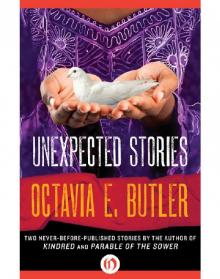- Home
- Octavia E. Butler
Clay's Ark Page 5
Clay's Ark Read online
Page 5
She stared at him curiously and was unable to conceal her disappointment at his thin, wiry body. He did not blame her. He was disgusted with his appearance himself, though he knew how deceptive it was. He had been good-looking once. Women had never been a problem for him.
This woman, however, was a problem already. Her expression said she recognized him. That was completely unexpected—that someone in this isolated place would keep up with current events enough to know what one of fourteen astronauts looked like. Unfortunately, his face had changed less than the rest of him. It had always been thin. And with the Ark returning, there must have been a great rebroadcasting and republishing of old pictures. This woman had probably just seen several of them in Barstow.
“How have you lost so much weight?” she asked as he pulled on a shirt. The clothing belonged to Gabriel Boyd, the father of the family. He was thin, too, though not quite as tall. The pants were too short. “You look like you haven’t eaten for weeks,” Meda said.
“I am hungry,” he admitted.
“My mother says you just ate enough for two people.”
He shrugged. He was still hungry. He was going to have to do something about it soon.
“We don’t have a videophone,” she said, “or a telephone, or even a radio.”
“That’s okay. I don’t want to call anyone.”
“Why not?”
He did not answer.
“What do you want?” she asked.
“I want you to get out of here before your father or one of your brothers gets the wrong idea.”
“This is my room.”
That did not surprise him. The room did not look as though it belonged to a young woman. There was no clothing in sight, no perfume or makeup, no frills. But it smelled of her. The bed smelled of her.
“I was in Barstow with my brothers overnight,” she said. “There are some supplies my brothers can’t be trusted to buy, even with a list.” She gave him a sad smile. “So I went to the big city.”
“Barstow?” Like most desert towns, it had been water-short and shrinking for years—not that it had ever been big.
“Anything bigger would be too sinful. It might tempt me or contaminate me or something. You know, I’ve only been to L.A. twice in my life.”
He wiped his wet face with dripping hands. She did not know how she tempted him to contaminate her. His compulsion was to touch her, take her hands perhaps, scratch or bite if she pulled away. Sex would have been very satisfying with her, too, though not as satisfying as when she reached her fertile time. She was not the kind of woman who would have attracted him in any way at all before. Now all a woman had to do to attract him was smell uncontaminated.
He looked away from her, sweat soaking into his borrowed clothing. “You’re not missing anything by keeping away from cities,” he said. He had been born in a so-called middle-class residential area of that same vast, deadly Los Angeles she wanted more of, and if not for his grandfather, he would probably already have died there. Many of the people he had grown up with had died of too much L.A. A girl like this one, not pretty, eager for attention and excitement, would not survive a year in L.A.
“We barely have running water here,” she grumbled.
Fool. She had clean, sweet well water here, free for the taking. In stinking L.A., she would have a limited amount of flat, desalinized, purified, expensive ocean water. In L.A., you could tell how little money a man had by how bad he smelled. “You don’t know when you’re well off,” he told her. “But if you’re crazy enough to want to try city life, why don’t you just move?”
She shrugged, looking surprisingly young and vulnerable. “I’m afraid,” she admitted. “I guess I haven’t cut the umbilical yet. But I’m working on it.” She fell silent for a moment, then said, “Asa?”
He looked at her sidelong. “Girl, even my enemies have more sense than to call me that.”
“Elias then,” she said, smiling.
“Eli.”
“Okay.”
“You tell anybody?”
“No.”
That was true. She was enjoying having the secret too much to give it away. Now he had to keep her quiet.
“Why are you here?” she asked. “Why aren’t you being debriefed or paraded down some big city street or something?”
Why was he not in isolation, she meant. Why was he not waiting and contending with a misery no one but him could understand while a dozen doctors discovered what a dangerous man he was? Why was he not dead in an escape attempt? And considering the loss of the ship, its wealth of data, its frozen, dead crew, and its diseased, living crew, debriefing was a laughably mild name for what he would have been put through.
“What’s the matter?” Meda asked softly. She had a big voice, not intended for speaking softly, but she managed. She had come closer. God help her, why didn’t she go away? Why didn’t he order her away or leave himself?
She touched his arm. “Are you all right?”
His body went on automatic. Helplessly, he grasped her hand. He managed not to scratch her, and tried to feel good about that until he saw that she had a small abrasion on the back of her hand. That was enough. His touch would probably have been enough anyway. Eventually she would have eaten something with that hand or scratched her lip or wiped her mouth or scratched or licked her hand to quiet the slight itching sensation contamination sometimes produced. And the disease organism could live on the skin for hours in spite of normal, haphazard hand-washing. Any person he touched was almost certainly doomed in one way or another.
“Why are your hands wet?” she asked. And when he did not answer, she examined his hands. He had expected her to drop them in disgust, but she did not seem disgusted. She was a big, strong girl. Maybe she could be saved. Maybe he could save her—if he stayed.
He remembered trying vainly to save his wife, Disa. She had been a short, slender woman with no weight to lose, barely big enough to qualify for the space program. The disease had eaten her alive. She had been one of the mission’s two M.D.s, however, and before she died, she and Grove Kenyon, the other doctor, had discovered that the disease organism caused changes that could be beneficial—if the host survived its initial onslaught. Surviving hosts became utterly resistant to more conventional diseases and more efficient at performing certain specialized functions. Only the toxin excreted by the disease organism was life-threatening. Not surprisingly, the human body had no defense against it. But in time the organism changed, adapted, and chemically encouraged its host to adapt. Its by-products ceased to be toxic to its host and the host ceased to react as strongly to increased sexual needs and heightened sensory awareness—inevitable effects of the disease. The needed time was bought by new organisms of the same disease—new organisms introduced after significant adaptation had occurred. The new, unadapted organisms quickly spent themselves neutralizing the toxic wastes of the old. Thus, the new organisms had to be replaced frequently. The host body was a hostile environment for them—an environment already occupied, claimed, chemically marked by others of their kind. Their toxin-neutralization was merely their reflexive effort to survive in that hostile environment.
But the original invading organisms had too much of a start. Or, if they were not well started, if the new organisms were introduced too soon, those new organisms simply became part of the original invasion, and the host, the patient, was no better, no worse.
The meager statistics provided by the crew and the few experimental animals they managed to raise from frozen embryos seemed to support these findings. All four of the surviving crew members had been reinfected several times. There were no survivors among the first crew members stricken. These had been isolated and restrained. Their vital functions had been continually monitored and restored when they failed. But finally their brains had ceased to function.
Reinfection was the answer, then—or an answer. A partial answer. Without it, everyone died. With it, some lived. Disa had died. Meda was obviously stronger. Perhaps she
could live.
Present 8
MEDA BROUGHT BLAKE HIS bag when he asked for it and permitted him to examine her. She even permitted him to cleanse the scratches she had made on his arm and face, though she warned it would do no good. It had never done any good before when someone was infected, she said. The organisms were aggressive and fast. He had the disease.
She or someone else had found and sabotaged his panic button with one of the new permanent glues. With these, permanent meant permanent. He could not use the bag to call for help. Otherwise, the bag was intact. For Keira’s sake in particular, it was one of the best. His scope would probably give him a look at the Clay’s Ark organism, even if it was as small as Meda had said. He needed all the information he could get before he made his escape. It was not only a matter of his wanting to pass the information on. He also needed to know now of any weaknesses these people had. They were too good to be true in every way except appearance. He had to find something he could use against them.
“I could have used you when my children were born,” Meda told him as he took her blood pressure.
“Didn’t you have a doctor?” he asked. He checked her pulse.
“No. Just Eli and Lorene, my sister-in-law. We don’t bring anyone here if we don’t plan to keep them. And I didn’t dare go to a hospital. Imagine how many people I’d infect there.”
“Not if you told them the truth.”
She watched as he drew blood from her left arm. It went directly into the analyzer as would all her other specimens. “They’d put me in a goddamn cage,” she said. “They’d put my kids in one, too. They were born with the disease, you know.”
“Did they have any special problems?”
She turned her head to stare directly at him. “Not a one,” she said. She made no effort to conceal the fact that she was lying.
“What about you?” Blake asked gently. “Easy births?”
“Yeah,” she said. Her defensiveness vanished. “The first one really surprised me. I mean, I was scared. I expected to be in agony, and I don’t handle real pain that well. But the kid popped out with no trouble at all. Felt like cramps.”
“You were lucky there was no emergency. May I see your children?”
“Not until you’re safe, Blake.”
“Safe?”
“When you’ve been sick and gotten well again, then we’ll have nothing to worry about. We’ll show you anything you want.”
He frowned. “Do you imagine I’d hurt a child?”
“Probably not,” she said. “But you’re at the seeking-weakness stage, and Jacob and Joseph would be a hell of a weakness. If you used them, we’d have to kill you. We want you alive, Blake.”
He looked away from her in growing desperation. They really were too good—always a step ahead. How many times had they done this—abducted people, made them vanish from the world outside. He had to beat them at a game they knew all too well. But how?
Meda rubbed his arm with a wet hand. “Look,” she said, “it isn’t so bad here. You can do a lot of good—maybe more good than you could do anywhere else. You can help us prevent an epidemic.”
“It’s only a matter of time before your disease gets out of hand,” he said.
“We’ve kept that from happening for more than four years.”
“Yet it could happen tomorrow.”
“No!” She got up and began to pace. “I can’t really make you understand until you’ve felt it, but we’d go crazy if we were caged. We’d probably kill ourselves trying to escape. The compulsion keeps us on a pretty thin edge as it is. Eli says we’re holding on to our humanity by our fingernails. I’m not sure we’re holding on to it at all. In some ways, I’m more realistic than he is. But maybe we need a little of his idealism. God knows how he’s kept it.” She glanced at Blake. “He’s my kids’ father, you know.”
“I guessed,” Blake said.
“He helps us hold on even if all we’re holding on to is an illusion. Take away that illusion and what’s left is something you wouldn’t want to deal with. You’ll see.”
“If your veneer of humanity is that thin,” Blake said, “it’s only a matter of time before someone finds it too thin. And if what you’ve told me about the disease is true, one person could infect hundreds and those hundreds could infect thousands—all before the first victim began to show symptoms and realize they were sick.”
“Your estimate is low,” she said. “Now do you see why you have to stay here? You could become that one person.”
He did not argue with her. He would escape and go to a hospital; that was all. “I’d like you to undress,” he said. He had just collected a little of her sweat and taken—almost painlessly—a minute specimen of her flesh. The analyzer found something incomprehensible in both—probably the same something it had found in her blood and urine.
“Unidentifiable microbes,” the small screen said. It was able to show him tiny, spiderlike organisms in her flesh, some of them caught in the act of reproducing along with her cells—as part of her cells. They were not viruses. According to the computer, they were more complete, independent organisms. Yet they had made themselves at home in human cells in a way that should not have been possible—like plasmids invading and making themselves at home in bacteria. But these were hardly plasmids—solitary rings of DNA. These were more complex organisms that had sought out higher game than bacteria and managed to combine with it without killing it. They had changed it, however, altered it slightly, subtly, cell by cell. In the most basic possible way, they had tampered with Meda’s genetic blueprint. They had left her no longer human.
“The ones that live in the brain don’t have little legs—cilia, I mean,” Meda said over his shoulder.
“What?”
“Eli told me they get into the brain cells, too. It sounds frightening, but there isn’t anything we can do about it. I guess they’d have to reach the brain to change us so.”
She did not know how changed she was. Could there be any hope of reversing such elemental changes? There must be, for his daughters’ sake.
“Eli and I used to talk about it a lot,” she said. “He wanted me to know everything he knew—in case anything happened to him. He said his wife and the other doctor did autopsies on the crew members who died before them. They found little round organisms in the brains of every one of them.”
“Rabies again,” Blake muttered. But no. Rabies was only a virus, preventable and curable.
“Eli’s wife tried to make antibodies,” Meda said. “It didn’t work. I don’t remember what else she tried. I didn’t understand, anyway. But nothing worked except reinfection. They found out about that by accident. And it works better person-to-person than person-to-syringe. Maybe that’s just psychological, but we don’t care. We’ll use anything that works. That’s why I’m here with you.”
“You’re here to try to make a good carrier of me,” he said.
She shrugged. “You’ll be that or die. I’d rather live myself.”
There was another answer. There had to be. He could not find it with only his bag, but others, researchers with lab computers, would sooner or later come up with answers. First, though, they had to be made aware of the questions.
He turned to look at Meda and saw that she had stripped. Surprisingly, she looked less scrawny without her clothing. More like the human female she was not. What could her children be like?
She smiled. “All my clothes are too big,” she said. “I put them on and I look like a collection of sticks, I know. Maybe now I’ll buy a few new things next time I’m in town.”
He ignored the obvious implication, but could not ignore the way she kept reading him. He became irrationally afraid that she was reading his mind, that he would never be able to keep an escape plan from her. He tried to shake off the feeling as he proceeded with the examination. She said nothing more. He got the impression she was sparing him, humoring him.
He asked to examine others in the community when he finished wit
h her, but she was not ready to share him with anyone else.
“Start checking them tomorrow if they’ll let you,” she said. “You’ll smell different then. Less seductive.”
“Seductive?”
“I mean you’ll smell more like one of us. Nobody will take any special pleasure in touching you then.” She had dressed again in her loose, ugly clothing. “It’s sexual,” she said. “Or rather, it feels sexual. Touching you is almost as good as screwing. It would be good even if I didn’t like you. If not for people like you—people we have to catch and keep, I could never control myself enough to go into town. With no outlet it gets—painful and crazy, sort of frenzied when there are a lot of unconverted people around. I have dreams about suddenly finding myself moving through a crowd—maybe on a big city street. Moving through a crowd where I have no choice but to keep touching people. I don’t even know whether to call it a nightmare or not. I’m on automatic. It’s just happening.”
“You’d like it to happen,” he said, watching her.
“Pigshit!” she replied, abruptly angry. “If I wanted it to happen, it would happen. I’d get in my car and I’d drive. I could infect people in towns from here to New York. And I’d do exactly that if I ever had to leave this place. There would be no one to help me, stop me.” She hesitated, then sat down on the bed beside him. He managed not to recoil when she took his hand. He was getting information from her. Let her touch him as long as she kept talking.
“You’ve got to understand,” she said. “It’s really hard on us the way we limit our growth. We can only do it because we’re so isolated. But if you escaped—with or without your kids—we’d have to escape too before you could send people here to corral us. I don’t know where we’d go, but chances are, we’d have to split up. Now you imagine, for instance, Ingraham out there on his own. He was high-strung before, and damned undisciplined. He doesn’t shake because there’s more wrong with him than with the rest of us. He shakes because he’s holding himself back almost all the time. He respects Eli and he loves Lupe. She’s going to have his kid. But you force him out of here, and all by himself, he’ll start an epidemic you won’t believe.”

 Patternmaster
Patternmaster Survivor
Survivor Clay's Ark
Clay's Ark Bloodchild and Other Stories
Bloodchild and Other Stories Parable of the Sower
Parable of the Sower Wild Seed
Wild Seed Fledgling
Fledgling Unexpected Stories
Unexpected Stories Kindred
Kindred Lilith's Brood: Dawn / Adulthood Rites / Imago
Lilith's Brood: Dawn / Adulthood Rites / Imago Adulthood Rites
Adulthood Rites Mind of My Mind
Mind of My Mind Seed to Harvest
Seed to Harvest Lilith's Brood: Dawn, Adulthood Rites, and Imago (Xenogenesis Trilogy)
Lilith's Brood: Dawn, Adulthood Rites, and Imago (Xenogenesis Trilogy) Bloodchild
Bloodchild Seed to Harvest: Wild Seed, Mind of My Mind, Clay's Ark, and Patternmaster (Patternist)
Seed to Harvest: Wild Seed, Mind of My Mind, Clay's Ark, and Patternmaster (Patternist)